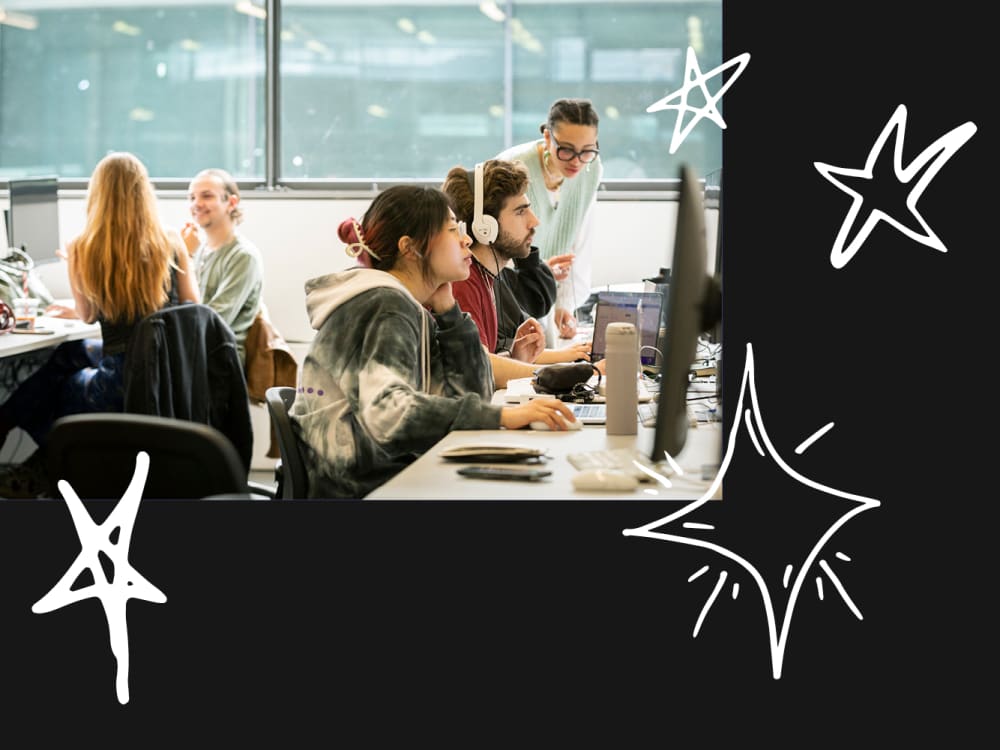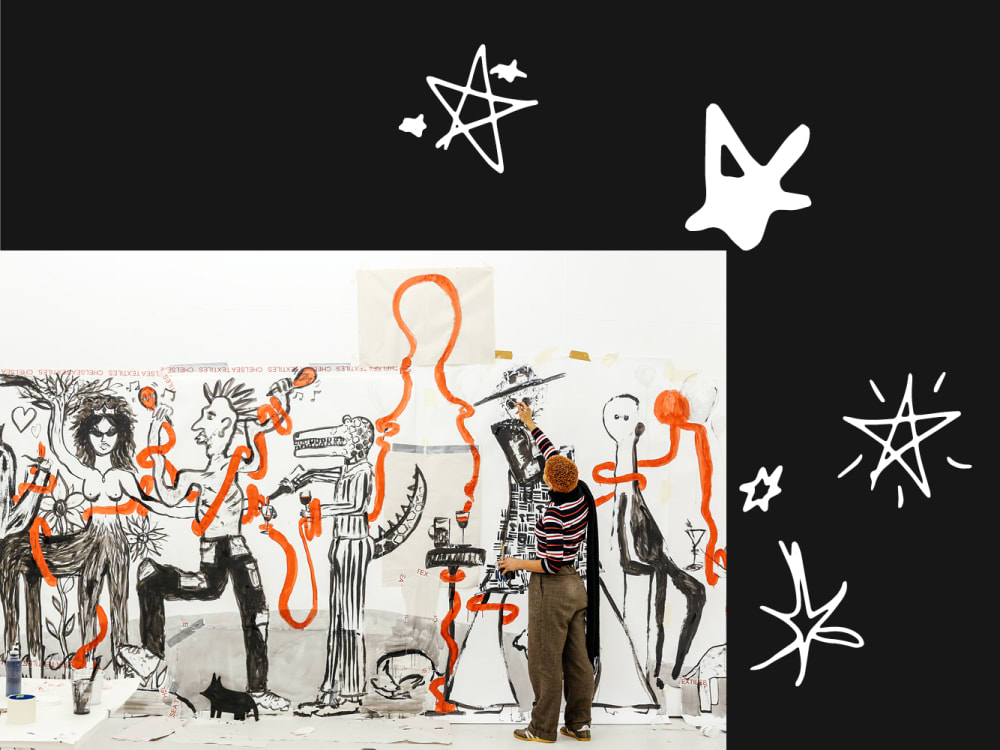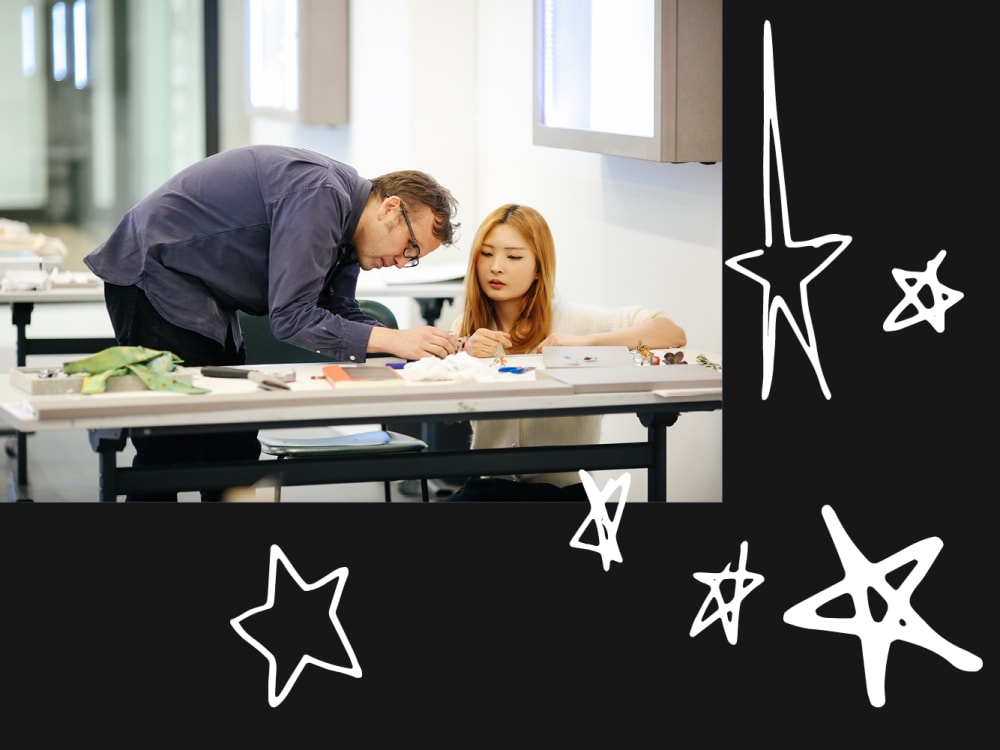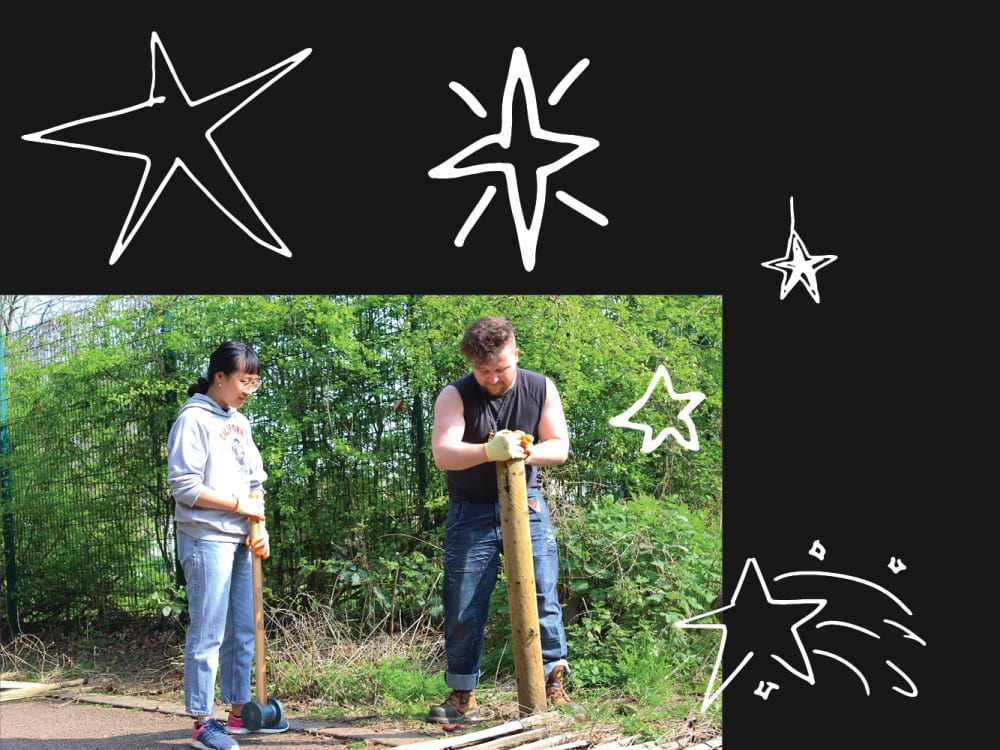Explore UAL
Explore how UAL supports your experience through diversity, safety, sustainability and listening. Learn about how we're organised and how we hold ourselves to the highest values.
Diversity and inclusion
We believe the diversity of our staff and student community is fundamental to creative thinking and innovation in the arts. We're proud of our diverse student communities and are committed to making University an inclusive and supportive environment for everyone. We're dedicated to removing barriers to progression and success, as well as promoting understanding and awareness of equality, diversity and inclusion for all.
We work in partnership with Arts Students’ Union to support initiatives to promote this and provide confidential advice and guidance to all students, including trans and non-binary students, student carers and parents and students from diverse faith, ethnicity, gender identity and sexual orientation backgrounds.

Tell Someone
We do not tolerate any form of racism, bullying, harassment or sexual violence. If you see or experience it, please report it through our anonymous Tell Someone form.
As well as reporting an incident, we’ll let you know about the support available, discuss formal and informal ways of resolving an issue, and signpost you to further information.
Sexual consent training
We're committed to promoting a positive sexual consent culture and raising awareness of support both within and outside the University. No one ever deserves to experience any form of sexual violence or harassment and it's never the survivor’s fault.
Students are encouraged to take a short online training module aimed to start a conversation about what sexual consent means and challenge myths surrounding sexual violence. You'll learn about consent, consent myths, how to tackle rape culture and where to find support.
Please be aware that the module includes scenarios that discuss rape and sexual assault. We recommend being in a safe space when you complete the module and considering if there's any support that you might want or need.
Health and safety
We want UAL to be a safe place for all students, staff and visitors. We take health and safety very seriously.
If you need support around you're health and wellbeing you can find more info on our support hub.

Health and wellness
We're committed to keeping our community safe and well while enjoying a rich and engaging university life.
We ask that you:
- stay at home when unwell, especially with symptoms of viruses
- follow University, UK government and NHS guidance
- use sanitising resources
- respect members of the community who choose to wear a face covering.
Security
We want to make sure you always feel safe on our site. If you have an urgent security concern, please report it to the site reception, or to one of the security team.
Or, you can report any damage, trespass or crime through our security incident reporting form.
Safe working
When you start your course, you'll be given an induction to the site and safe working practices while on and off site. You’ll be given detailed safety information, like fire and emergency procedures and rules for using machinery in a safe and sensible way. You need to be directly supervised by a technician to work in high-risk areas.
For your own safety, we ask that you don’t work alone in our rooms and that there should always be at least 3 people in a room at any time. This is important because if an accident happens, one person can stay with the injured person and the other can go for help.
Evacuation assistance
If you need assistance to evacuate a building in an emergency, your course leader will make sure a Personal Emergency Evacuation Plan (PEEP) is completed with you. Your PEEP will describe what you need to do in an emergency and what assistance will be provided by other people.

Health and Safety Induction for Students
Risk assessments
During your studies you may need to complete a risk assessment for your work. This is an important part of planning your work, identifying any hazards, keeping you and other people safe. You can find the general risk assessment form in your course handbook and on Moodle.
You can find guidance on completing a risk assessment and you can speak to your tutors or the College Health and Safety Advisor for more information.
Hazardous substances
There are several activities, processes and pieces of equipment at UAL that are potentially hazardous. We take action to limit these hazards as much as we can, but also expect you to follow the instructions and safety rules when using ladders, lathes, milling and cutting machinery, electrical equipment and chemicals.
We may also ask you to wear protective equipment such as ear defenders or safety glasses, or to use other safety equipment like equipment guards. You'll be told about these requirements at your workshop and studio inductions; and you can find guidance on identifying and assessing hazardous substances. If you have any questions or need advice, please speak to your tutor or one of the technicians.
Our values
We uphold the values of social justice and environmental stewardship through our teaching and research, as well as in the way we live, work and conduct our operations.
Our strategy
We've set out a 10-year strategy to address the changing world. We identified the challenges and opportunities that are most important to us and our future and developed 3 guiding policies in response.
- To give our students the education they need to flourish in a changing world.
- To bring a high-quality creative education to more students than ever before.
- To change the world through our creative endeavour.
Sustainability
Sustainability is central to everything we do. In 2023/24 People & Planet University League we were ranked 4th greenest university in the UK, keeping our position as the country’s highest-ranking arts university. Many of our courses dedicate time and resources to teaching sustainable practices and ideas and our central operations teams are committed to working in a sustainable way.
We recently introduced our incredibly popular Re-Use units across our sites. These units allow students and staff to deposit unwanted or excess materials, so that fellow students can make use of them.
Climate Action Plan
Our Climate Action Plan is our formal, public statement on how we'll manage, report, set targets and promote environmental stewardship. We’re working to ambitious net zero carbon targets, which will see us reach net zero on our direct emissions by 2030 and net zero by 2040 for our indirect emissions. This is 10 years ahead of the UK Government’s deadline.

Green buildings
We pride ourselves on building for the future. London College of Fashion’s new 30,000m2 East Bank campus has achieved BREEAM ‘outstanding’ classification, one of the largest buildings in an urban environment to achieve this. The new campus opened to students and staff in September 2023 and is part of the The Queen Elizabeth Olympic Park development along with V&A, BBC, Sadler’s Wells and UCL.
In 2018 Camberwell was a 'Campus of the Future’ Green Gown award finalist, for their ‘Celebrate Camberwell’ campus redeveloped. The Wimbledon Studio building also won the RIBA London Sustainability Award 2017 and a Green Apple Award for sustainability.
UAL Climate Emergency Network
Join the growing community of students and staff who share the belief that urgent collective action is needed in the face of climate and ecological emergency. Open to all, the network is a collaborative of students and staff from across UAL. They publish a regular newsletter, generates resources, curate exhibitions and organise events, while also lobbying the University and external bodies on matters related to environmental policy, practice and justice.
Our organisation
Colleges and Institutions
As the world changes and progresses, so do our academics and their projects. To reflect this, we've set up a number of specialist institutes to focus on cutting edge research and knowledge exchange, teaching, external partnerships and specialist programmes. This sits along our 6 colleges with a long established global reputation for producing outstanding work.
Archives and Collections
As a student, you have access to our outstanding physical and digital collections of art, design, communication, fashion and performance. These collections include historical archives and special collections such as zines, material samples and artists’ books.
You can also access the University Archives and Special Collections Centre at LCC which specialises in material on printing, graphics and film, including the famous Stanley Kubrick Archive. Other collections in the University include the LCF Archive and the Museum & Study Collection at CSM.
Knowledge Exchange
UAL works with many external partners to create positive change; this is called Knowledge Exchange (KE). Students, graduates and academics come together through KE initiatives to collaborate with businesses of all sizes, local communities, councils, charities, arts institutions and other universities.
You may be involved in KE projects through your course or by getting involved in extra-curricular initiatives during your studies or after you graduate. Thanks to these activities, students get to apply their expert knowledge and skills to real-life scenarios, harnessing the power of creativity and innovative thinking to co-create value for society, the economy and our environment.
Knowledge Exchange
UAL x Southwark Council: representing diverse voices through public art